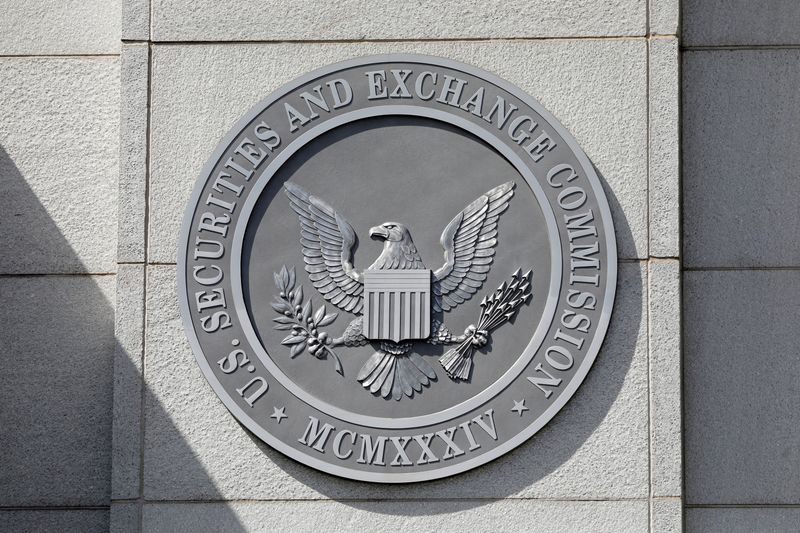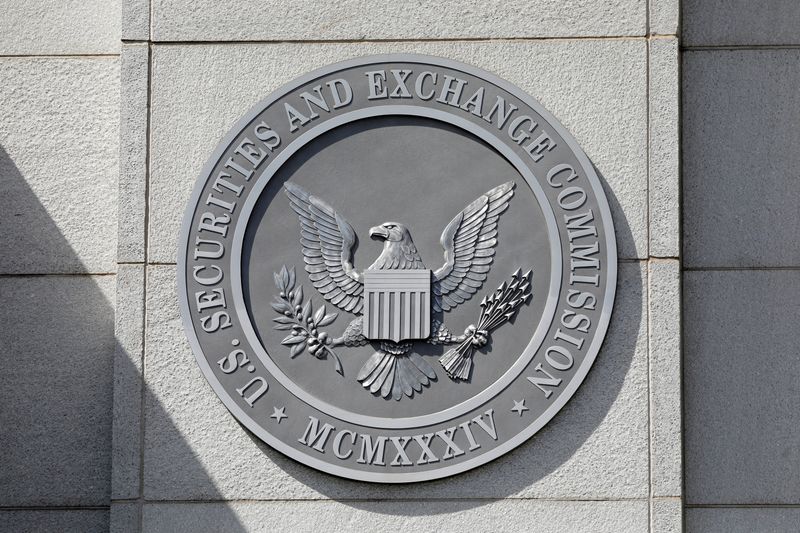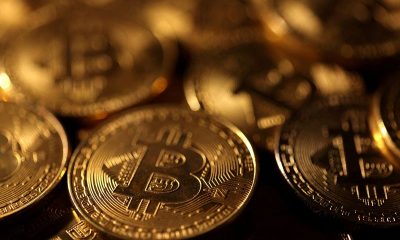Economy
US SEC cracks down on funds “greenwashing” with new investment requirement


© Reuters. FILE PHOTO: The seal of the U.S. Securities and Exchange Commission (SEC) is seen at their headquarters in Washington, D.C., U.S., May 12, 2021. REUTERS/Andrew Kelly/File Photo
By Douglas Gillison and Michelle Price
WASHINGTON (Reuters) -Wall Street’s top regulator on Wednesday adopted a new rule cracking down on so-called “greenwashing” and other deceptive or misleading marketing practices by U.S. investment funds.
The changes to the two decades-old Securities and Exchange Commission (SEC) “Name Rule” requires that 80% of a fund’s portfolio matches the asset advertised by its name.
It takes aim at a boom in funds that have tried to exploit investor interest in environmental, social and governance, or ESG, investing with names that do not accurately reflect its investments or strategies.
“A fund’s investment portfolio should match a fund’s advertised investment focus,” SEC chair Gary Gensler said on Wednesday at a meeting to vote on the rule. “Such truth in advertising promotes fund integrity on behalf of fund investors.”
The SEC since 2021 has also focused on prosecuting ESG-related misconduct and “greenwashing”, bringing enforcement actions and levying fines.
Financial reform advocates say billions of dollars are now invested in popular funds that may actually support fossil fuel production and do not meet the ESG goals suggested by their names, which can change frequently.
The rule also targets funds with names suggesting a focus on particular characteristics, like “growth” and “value,” or particular economic themes or investment strategies, such as artificial intelligence, big data, or health innovation.
Funds would also be required to define the terms they use and explain the criteria for selecting investments in their disclosures.
The 80% investment requirement currently applies to other fund characteristics such as risk. As a result of the change, 76% of investment funds would be subject to the “Names Rule” up from the current 60%, SEC officials said prior to the vote.
Trade organizations have attacked the proposal, first issued in May of last year, claiming its requirements would be impracticably subjective, cause confusion among investors, and encourage superficial judgments based solely on names.
“The rule sweeps more than three-quarters of all the funds in the U.S. into its dragnet, going far beyond ESG funds—the supposed root of the rulemaking—with no justification,” Eric Pan, CEO of the Investment Company Institute, a major Washington funds group, said in a statement on Wednesday.
“The only thing that this rule achieves is to insert the SEC deeper into funds’ investment decision-making processes.”
In a concession to industry, the change will allow 90 days, rather than the originally proposed 30, for corrective action if funds fall out of compliance with the 80% standard.
Economy
Russian central bank says it needs months to make sure CPI falling before rate cuts -RBC


© Reuters. Russian Central Bank Governor Elvira Nabiullina attends a news conference in Moscow, Russia June 14, 2019. REUTERS/Shamil Zhumatov/File Photo
MOSCOW (Reuters) – Russia’s central bank will need two to three months to make sure that inflation is steadily declining before taking any decision on interest rate cuts, the bank’s governor Elvira Nabiullina told RBC media on Sunday.
The central bank raised its key interest rate by 100 basis points to 16% earlier in December, hiking for the fifth consecutive meeting in response to stubborn inflation, and suggested that its tightening cycle was nearly over.
Nabiullina said it was not yet clear when exactly the regulator would start cutting rates, however.
“We really need to make sure that inflation is steadily decreasing, that these are not one-off factors that can affect the rate of price growth in a particular month,” she said.
Nabiullina said the bank was taking into account a wide range of indicators but primarily those that “characterize the stability of inflation”.
“This will take two or three months or more – it depends on how much the wide range of indicators that characterize sustainable inflation declines,” she said.
The bank will next convene to set its benchmark rate on Feb. 16.
The governor also said the bank should have started monetary policy tightening earlier than in July, when it embarked on the rate-hiking cycle.
Economy
China identifies second set of projects in $140 billion spending plan


© Reuters. FILE PHOTO: Workers walk past an under-construction area with completed office towers in the background, in Shenzhen’s Qianhai new district, Guangdong province, China August 25, 2023. REUTERS/David Kirton/File Photo
SHANGHAI (Reuters) – China’s top planning body said on Saturday it had identified a second batch of public investment projects, including flood control and disaster relief programmes, under a bond issuance and investment plan announced in October to boost the economy.
With the latest tranche, China has now earmarked more than 800 billion yuan of its 1 trillion yuan ($140 billion) in additional government bond issuance in the fourth quarter, as it focuses on fiscal steps to shore up the flagging economy.
The National Development and Reform Commission (NDRC) said in a statement on Saturday it had identified 9,600 projects with planned investment of more than 560 billion yuan.
China’s economy, the world’s second largest, is struggling to regain its footing post-COVID-19 as policymakers grapple with tepid consumer demand, weak exports, falling foreign investment and a deepening real estate crisis.
The 1 trillion yuan in additional bond issuance will widen China’s 2023 budget deficit ratio to around 3.8 percent from 3 percent, the state-run Xinhua news agency has said.
“Construction of the projects will improve China’s flood control system, emergency response mechanism and disaster relief capabilities, and better protect people’s lives and property, so it is very significant,” the NDRC said.
The agency said it will coordinate with other government bodies to make sure that funds are allocated speedily for investment and that high standards of quality are maintained in project construction.
($1 = 7.1315 renminbi)
Economy
Russian central bank says it needs months to make sure CPI falling before rate cuts -RBC


© Reuters. Russian Central Bank Governor Elvira Nabiullina attends a news conference in Moscow, Russia June 14, 2019. REUTERS/Shamil Zhumatov/File Photo
MOSCOW (Reuters) – Russia’s central bank will need two to three months to make sure that inflation is steadily declining before taking any decision on interest rate cuts, the bank’s governor Elvira Nabiullina told RBC media on Sunday.
The central bank raised its key interest rate by 100 basis points to 16% earlier in December, hiking for the fifth consecutive meeting in response to stubborn inflation, and suggested that its tightening cycle was nearly over.
Nabiullina said it was not yet clear when exactly the regulator would start cutting rates, however.
“We really need to make sure that inflation is steadily decreasing, that these are not one-off factors that can affect the rate of price growth in a particular month,” she said.
Nabiullina said the bank was taking into account a wide range of indicators but primarily those that “characterize the stability of inflation”.
“This will take two or three months or more – it depends on how much the wide range of indicators that characterize sustainable inflation declines,” she said.
The bank will next convene to set its benchmark rate on Feb. 16.
The governor also said the bank should have started monetary policy tightening earlier than in July, when it embarked on the rate-hiking cycle.

 Forex3 years ago
Forex3 years agoForex Today: the dollar is gaining strength amid gloomy sentiment at the start of the Fed’s week

 Forex3 years ago
Forex3 years agoUnbiased review of Pocket Option broker

 Forex3 years ago
Forex3 years agoDollar to pound sterling exchange rate today: Pound plummeted to its lowest since 1985

 Forex3 years ago
Forex3 years agoHow is the Australian dollar doing today?

 Cryptocurrency3 years ago
Cryptocurrency3 years agoWhat happened in the crypto market – current events today

 World3 years ago
World3 years agoWhy are modern video games an art form?

 Commodities3 years ago
Commodities3 years agoCopper continues to fall in price on expectations of lower demand in China

 Economy3 years ago
Economy3 years agoCrude oil tankers double in price due to EU anti-Russian sanctions

























